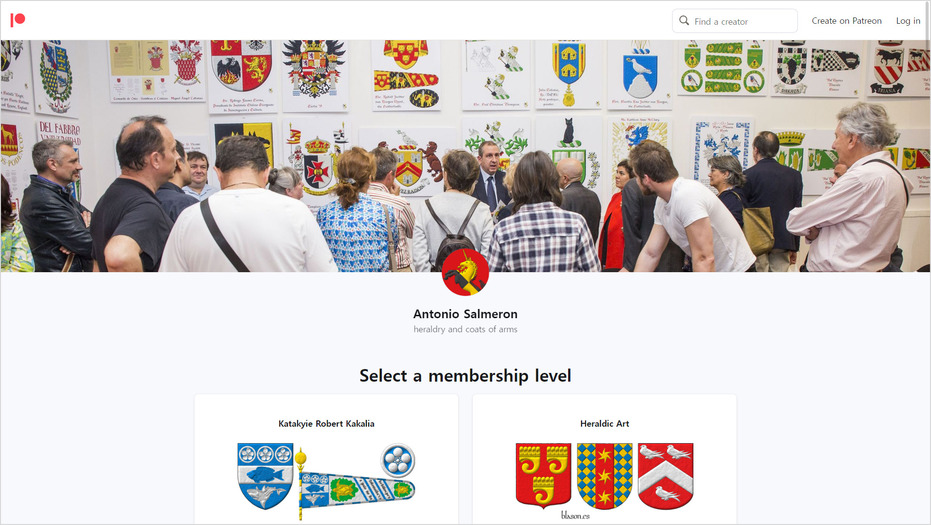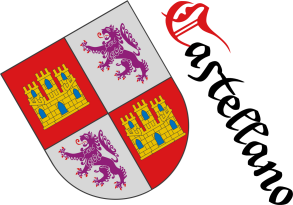
Baldovino from Venecia, lineage
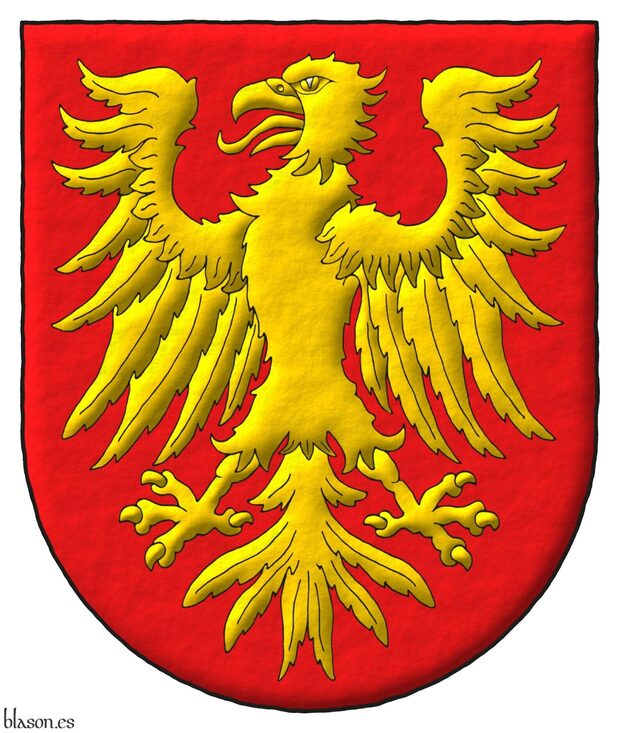
Gules, an eagle displayed Or.
Escudo de gules, un águila de oro.
Coat of arms interpreted by me, illuminated with lights and shadows, outlined in Sable, with a semi-circular outer contour and with a freehand finish.
Blazon keywords: Gules, Or, One, Eagle and Displayed.
Style keywords: Outlined in sable, Illuminated, Semi-circular and Freehand.
Classification: Personal, Lineage, Interpreted, Boa and Coat of arms.
Bearer: Baldovino from Venecia, lineage.


Laydin, lineage
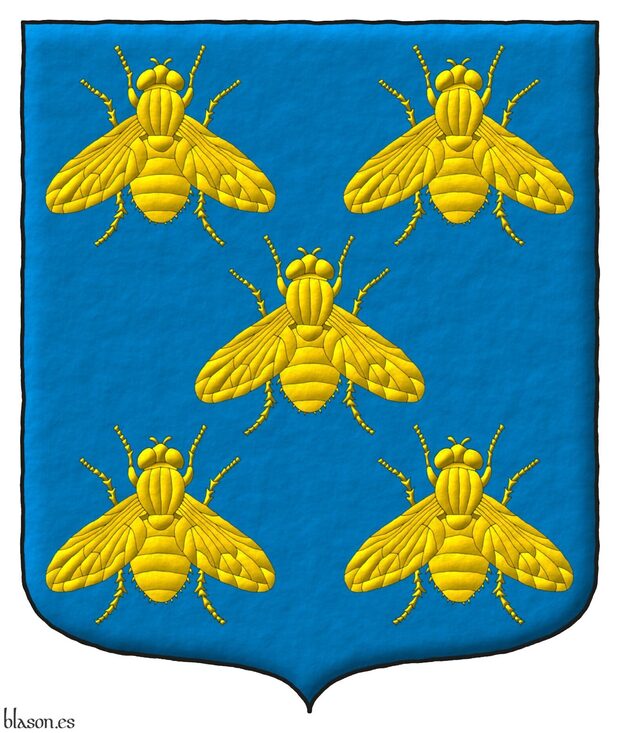
Azure, five flies in saltire Or.
Escudo de azur, cinco moscas puestas en sotuer de oro.
Coat of arms emblazoned by me, highlighted with lights and shadows, contoured in Sable, with an ogee external shape and with a freehand finish.
This is the coat of arms of the lineage Laydin emblazoned by me, as described in [Cadenas y Vicent, V. de; 1987; page 989], whose blazon is equivalent to that of the Zendreros lineage, also described in [Cadenas y Vicent, V. de; 1987; page 1941].
Blazon keywords: Azure, Or, Five, Fly and In saltire.
Style keywords: Outlined in sable, Illuminated, Ogee and Freehand.
Classification: Personal, Lineage, Interpreted, Boa and Coat of arms.
Bearer: Laydin, lineage.


Edmund Leighton, 1901, The Accolade
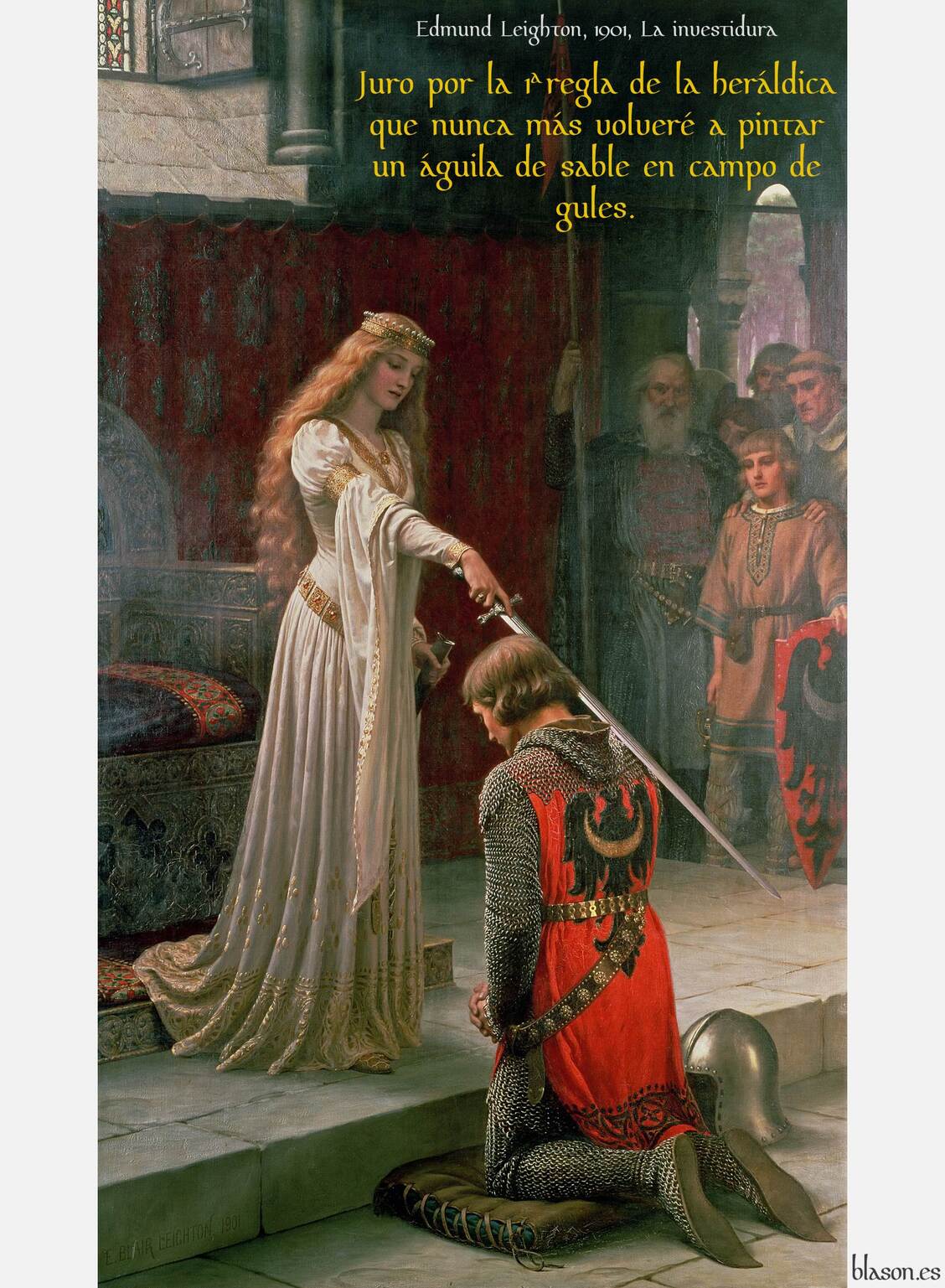
I swear by the 1st rule of heraldry I will never emblazon again an eagle Sable on a field Gules.
The heraldic rule of tinctures: «a colour cannot go on top of another colour and a metal cannot go on top of another metal».
This coat of arms is similar to the arms of Henry VI the Good, Prince of Silesia and Duque of Wroclaw, blazon: «Gules, an eagel displayed Sable».
If it was Edmund Leighton's intention to paint Henry VI, then the justification would be that Silesia is located in Poland and in the Polish heraldic tradition, the sable is considered a neutral tincture, that is neither color nor metal, so they can put the sable on the color gules. But I doubt that the Prince of Silesia and Duke of Wroclaw would have needed to be knighted.
Categories: Technology, Social networks, Colour on colour, Eagle, Sable and Gules.


Patreon
My heraldic Patreon wall is patreon.com/HeraldicArtbyAntonioSalmeron.
Categories: Technology and Social networks.


Johann Anton Freiherr von Quast, plain tincture

Gules, a saltire Or charged with a fillet saltire Sable between in chief three escallops reversed Or; in dexter, a dexter arm embowed, vambraced Argent, holding an anchor Or; in sinister a two masted warship, with cannons ports and sails hoisted Or, two flags Gules, Argent and Azure flying to dexter, one in the main mast and one in the stern, on the hull the inscription «La Liberta» Sable; in base a crowned double-headed eagle displayed Or, holding two tassels, one in each beak, and two mullets of six points pierced, one in each talon Argent.
Arms depicted by me, in plain tinctures, outlined in Sable, with an ogee external shape and with a texturized finishing.
This is the coat of arms of Johann Anton Freiherr von Quast that was painted in the Freiherren diploma that was issued in 1790.
Blazon keywords: Gules, Or, Argent, Azure, One, Three, Two, Saltire, Fillet saltire, Between, In chief, Escallop, Reversed, In dexter, Dexter, Arm, Embowed, Vambraced, Grasping, Anchor, Ship, Cannon port, Sail, Inscribed, In base, Crowned, Double-headed, Eagle, Tassel, Beak, Mullet of six points pierced and Talon.
Style keywords: Outlined in sable, Plain tincture and Ogee.
Classification: Personal, Interpreted, Boa, Coat of arms and Flag.
Bearer: Quast, Johann Anton Freiherr von.


Quast, Johann Anton Freiherr von

Gules, a saltire Or charged with a fillet saltire Sable between in chief three escallops reversed Or; in dexter, a dexter arm embowed, vambraced Argent, holding an anchor Or; in sinister a two masted warship, with cannons ports and sails hoisted Or, two flags Gules, Argent and Azure flying to dexter, one in the main mast and one in the stern, on the hull the inscription «La Liberta» Sable; in base a crowned double-headed eagle displayed Or, holding two tassels, one in each beak, and two mullets of six points pierced, one in each talon Argent.
Escudo de gules, un sotuer de oro cargado de un flanquis de sable, acompañado en jefe de tres veneras ranversadas de oro; en la diestra, un brazo diestro doblado, armado de oro, teniendo un ancla de plata; en la siniestra, un navío de guerra de dos mástiles, con troneras, las velas izadas de oro, con dos banderas de gules, plata y azur ondeando hacia la diestra, una en el palo mayor y otra en la popa, en el casco la inscripción «La Liberta» de sable; en punta, un águila bicéfala coronada de oro, teniendo dos borlas, una en cada pico, y dos espuelas, una en cada garra, todas de plata.
Arms interpreted by me, illuminated with lights and shadows, outlined in Sable, with an ogee external shape and with a watercolor finishing.
Blazon keywords: Gules, Or, Argent, Azure, One, Three, Two, Saltire, Fillet saltire, Between, In chief, Escallop, Reversed, In dexter, Dexter, Arm, Embowed, Vambraced, Grasping, Anchor, Ship, Cannon port, Sail, Inscribed, In base, Crowned, Double-headed, Eagle, Tassel, Beak, Mullet of six points pierced and Talon.
Style keywords: Outlined in sable, Illuminated, Ogee and Watercolor.
Classification: Personal, Interpreted, Boa, Coat of arms and Flag.
Bearer: Quast, Johann Anton Freiherr von.


Johann Anton Freiherr von Quast, structured and parallel blazons
This is the coat of arms of Johann Anton Freiherr von Quast that was painted in the Freiherren diploma that was issued in 1790. I have written the text of the blazon for this coat of arms in English and in Castilian in a structured way, to highlight the parallelism between both forms.
Blazon keywords: Gules, Or, Argent, Azure, One, Three, Two, Saltire, Fillet saltire, Between, In chief, Escallop, Reversed, In dexter, Dexter, Arm, Embowed, Vambraced, Grasping, Anchor, Ship, Cannon port, Sail, Inscribed, In base, Crowned, Double-headed, Eagle, Tassel, Beak, Mullet of six points pierced and Talon.
Style keywords: Outlined in sable, Illuminated, Ogee and Leather.
Classification: Personal, Interpreted, Structured and parallel blazons, Boa, Coat of arms and Flag.
Bearer: Quast, Johann Anton Freiherr von.


Arms of Johann Anton Freiherr von Quast without mantle
Gules, a saltire Or charged with a fillet saltire Sable between in chief three escallops reversed Or; in dexter, a dexter arm embowed, vambraced Argent, holding an anchor Or; in sinister a two masted warship, with cannons ports and sails hoisted Or, two flags Gules, Argent and Azure flying to dexter, one in the main mast and one in the stern, on the hull the inscription «La Liberta» Sable; in base a crowned double-headed eagle displayed Or, holding two tassels, one in each beak, and two mullets of six points pierced, one in each talon Argent. Crest: A helm befitting his degree, bearing an Adelskrone held in its place by two men Sable, vested with feather skirts Gules, each standing on the shield, and holding in his outer hand a diagonally placed tournament spears, headed Argent, and issuant from the Adelskrone, between two elephants' trunks, the one at dexter Or, the one at sinister Gules, two ostrich feathers in saltire, the one bendwise Argent, and the one bend sinisterwise Sable.
Coat of arms emblazoned by me, illuminated with lights and shadows, contoured in Sable, with an ogee outer contour and with a watercolor finish.
This is the coat of arms of Johann Anton Freiherr von Quast that was painted in the Freiherren diploma that was issued in 1790. This coat of arms has been emblazoned by me because the family needed a modern version that can be used digitally. More information about the family can be found on the website juchtervanbergenquast.wordpress.com.
Blazon keywords: Gules, Or, Argent, Azure, One, Three, Two, Saltire, Fillet saltire, Between, In chief, Escallop, Reversed, In dexter, Dexter, Arm, Embowed, Vambraced, Grasping, Anchor, Ship, Cannon port, Sail, Inscribed, In base, Crowned, Double-headed, Eagle, Tassel, Beak, Mullet of six points pierced, Talon, Crest, Helm, Mantle, Lined, Crown, Male figure, Vested, Feather, Skirt, Upon, Hand, Spear, Issuant, Trunk (elephant), Ostrich feather, In saltire, Bendwise and Bend sinisterwise.
Style keywords: Outlined in sable, Illuminated, Ogee and Watercolor.
Classification: Personal, Interpreted, Boa, Coat of arms and Flag.
Bearer: Quast, Johann Anton Freiherr von.

Continue with: Arms of Johann Anton Freiherr von Quast with mantle.
-
Language
-
Categories of heraldry
-
Divisions of the field
- Without divisions
- Party per pale
- Party per fess
- Party per bend
- Party per bend sinister
- Tierce
- Tierce sinister
- Tierced per pale
- Tierced per fess
- Tierced per bend
- Tierced pallwise inverted
- Quarterly
- Quarterly per saltire
- Gyronny
- Party per fess, the chief per pale
- Party per pale, the sinister per fess
- Party per fess, the base per pale
- Party per pale, the dexter per fess
- Chapé
- Chaussé
- Embrassé
- Contre-embrassé
- Party per chevron
- Enté
- Enté en point
- Flanched
-
Metals
-
Colours
-
Furs
-
Other tinctures
-
Ordinaries and sub-ordinaries
-
Diminutives of the ordinaries
-
Geometric charges
-
Composite ordinaries
-
Inanimate charges from Nature
Atom, Crescent, Diamond, Emerald, Estoile, Increscent, Lightning flash, Moon, Mount, Mullet, Mullet of four points, Orbital, Plough of Ursa Major, Rainbow, Ray of the sun, River, Sea, Snowflake, Sun, Sun in splendour, Sun of May, Trimount, Water and Wave.
-
Vegetal charges from Nature
Acorn, Apple, Apple tree, Ash, Bluebonnet, Camellia, Chrysanthemum, Cinquefoil, Cornflower, Dogwood flower, Double rose, Eguzki-lore, Elm, Fleur de lis, Flower, Gourd, Holm oak, Hop cone, Indian paintbrush, Kapok tree, Laurel, Lily, Linden, Lotus flower, Madonna lily, Mexican cedar tree, Oak, Olive tree, Palm tree, Plantain plant, Pomegranate, Poplar leaf, Rose, Shamrock, Sunflower, Thistle, Tree, Tulip, Vine and Wheat.
-
Animal charges from Nature
Badger, Bald eagle, Barbel, Barn owl, Bear, Beaver, Bee, Beetle, Bighorn sheep, Binson, Blackbird, Boar, Brach hound, Bull, Doe, Dog, Dolphin, Dove, Eagle, Elephant, Falcon, Female figure, Fish, Flame, Fly, Fox, Frog, Goat, Goldfinch, Goose, Heron, Horse, Hummingbird, Jaguar, Lark, Leopard, Lion, Lion passant, Lion rampant guardant, Lioness, Lynx, Male figure, Martlet, Merino ram, Owl, Panther, Parrot, Peacock, Pelican, Pelican in her piety, Pronghorn, Puffin, Quetzal, Raven, Roe deer, Rooster, Savage, Seagull, Serpent, She-wolf, Stag, Starling, Talbot, Turtle, Tyger, Vulture, Warren hound and Wolf.
-
Parts of natural charges
Arm, Beak, Branch, Caboshed, Chest, Claw, Covert, Dorsal fin, Eagle claw, Ear of wheat, Ermine spot, Escallop, Feather, Foot (palmiped), Foreleg, Forepaw, Hand, Head, Heart, Hoof, Leaf, Neck, Ostrich feather, Palm frond, Paw, Roe deers' attires, Shoulder, Sprig, Stags' attires, Stem, Swallow-tail, Tail, Tail addorsed, Tail fin, Talon, Tibia, Tooth, Trunk, Trunk (elephant), Two hands clasped, Two wings in vol, Udder, Wing and Wrist.
-
Artificial charges
Ace of spades, Anchor, Anvil, Arch, Arm vambraced, Armillary sphere, Arrow, Axe, Bell, Bell tower, Beret, Bonfire, Book, Bookmark, Bow, Branding iron, Bridge, Broken, Buckle, Cannon, Cannon dismounted, Cannon port, Canopy roof, Carbuncle, Castle, Celtic Trinity knot, Chain, Chess rooks, Church, Clarion, Clay pot, Closed book, Club, Column, Comb, Compass rose, Conductor's baton, Cord, Covered cup, Crozier, Crucible, Cuffed, Cup, Cyclamor, Dagger, Displayed scroll, Double vajra, Drum, Ecclesiastical cap, Fanon, Federschwert, Fleam, Four crescents joined millsailwise, Galician granary, Garb, Gauntlet, Geometric solid, Grenade, Halberd, Hammer, Harp, Host, Hourglass, Key, Key ward, Knight, Knot, Lantern, Letter, Line, Loincloth, Maunch, Menorah, Millrind, Millstone, Millwheel, Monstrance, Mortar, Mullet of six points pierced, Nail, Non-classic artifact, Norman ship, Number, Oar, Oil lamp, Open book, Page, Pair of pliers, Pair of scales, Parchment, Pestle, Piano, Pilgrim's staff, Plough share, Polish winged hussar, Port, Portcullis, Potent, Quill, Ribbon, Rosette of acanthus leaves, Sabre, Sackbut, Sail, Scroll, Scythe, Sheaf of tobacco, Ship, Skirt, Spear, Spear's head, Stairway, Star of David, Step, Sword, Symbol, Tetrahedron, Torch, Tower, Trident, Trumpet, Turret, Two-handed sword, Wagon-wheel, Water-bouget, Wheel, Winnowing fan and With a turret.
-
Immaterial charges
Angel, Archangel, Basilisk, Dragon, Dragon's head, Garuda, Golden fleece, Griffin, Heart enflamed, Justice, Mermaid, Our Lady of Mercy, Ouroboros, Paschal lamb, Pegasus, Phoenix, Sacred Heart of Jesus, Saint George, Sea-griffin, Trinity, Triton, Unicorn, Winged hand and Wyvern.
-
External elements
-
Heraldic creations
-
References
-
Formats
-
Keywords on this page
Between, Watercolor, Anchor, Vambraced, Azure, Flag, Ship, Double-headed, Boa, Tassel, Arm, Crest, Ogee, Crown, Crowned, Embowed, Outlined in sable, Dexter, Two, In chief, In dexter, In base, In saltire, Coat of arms, Skirt, Male figure, Fillet saltire, Lined, Talon, Personal, Gules, Illuminated, Inscribed, Interpreted, Spear, Or, Beak, Argent, Quast, Johann Anton Freiherr von, Reversed, Mullet of six points pierced, Saltire, Grasping, Three, Cannon port, One, Sail, Escallop and Eagle.

